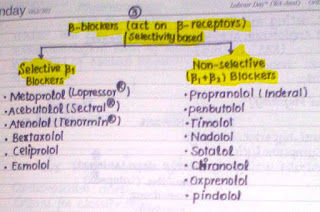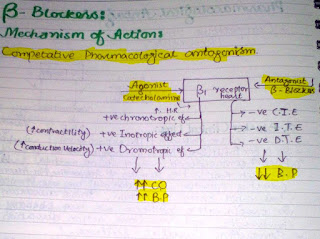Beta - Adrenoceptor blocking Agents
Beta blockers may further be classified on basis of their site of action into following two main classes namely
- cardioselective beta blockers (selective beta 1 blockers)
- non selective beta 1 + beta 2 blockers
Mechanisms of Action of beta blocker
Beta adrenoceptor Blockers competitively antagonize the responses to catecholamines that are mediated by beta-receptors. here is a sketch showing beta blocker in action.These drugs have a number of clinical uses, including treatment of cardiac arrhythmias and angina pectoris , for which their therapeutic benefit is directly related to the blockade of beta -receptors in the myocardium.timolol a beta blocker is used along with alpha blockers for treatment of glaucoma and pheochromocytoma treatment. beta-Blockers are also used in the treatment of hypertension, although this seems to be somewhat paradoxical in that blockade of vascular smooth muscle beta-receptors might be expected to unmask or leave unopposed responses to catecholamines that occur through vascular -receptors. Unopposed beta-mediated responses would be expected to increase, rather than decrease, blood pressure. Nevertheless, beta -blockers have proved to be quite effective antihypertensive agents, and they have an important place in the treatment of primary hypertension.Their mechanism of action are summarized as follows..
- Initial decrease in cardiac output, followed by reduction in peripheral vascular resistance.
- Other actions include decrease plasma renin activity, resetting of baroreceptors, release of vasodilator prostaglandins, and blockade of prejunctional beta-receptors.
Advantages Of Beta Blocker As Antihypertensive
The beta-blockers are quite popular antihypertensive drugs. They are well tolerated, and serious side effects are seldom observed. When used alone over several weeks, -blockers produce a significant reduction in blood pressure in approximately 30% of patients with
mild to moderate hypertension. Thus, Beta-blockers can be employed as a first step in the management of high blood pressure. However, they are often used in conjunction with a diuretic when therapy with a single agent is not satisfactory. some other advantages of beta blockers are...
mild to moderate hypertension. Thus, Beta-blockers can be employed as a first step in the management of high blood pressure. However, they are often used in conjunction with a diuretic when therapy with a single agent is not satisfactory. some other advantages of beta blockers are...
- Documented reduction in cardiovascular morbidity and mortality.
- Cardioprotection: primary and secondary prevention against coronary artery events (i.e. ischemia, infarction, arrhythmias, death).
- Relatively not expensive.
Practical Considerations
- Beta blockers are used with caution in patients with bronchospasm.
- Contraindicated in more than grade I AV, heart block.
- Do not discontinue abruptly.
Side Effects Of Beta Blockers
Although the beta-blockers are well-tolerated drugs and patient compliance is good, there may be problems with their administration, particularly in patients with decompensated hearts and cardiac conductance disturbances.in that case their pharmacological effects gets accompanied by side effects that may be..CNS related Side Effects
i.e propranolol is lipophillic therefore it can cross blood brain barrier and cause drowsiness, sedation, sleep disorders, confusion, lethargy etc.however attinolol do not have this side effect because it is hydrophillic.
Cardiovascular system related Side Effects
i.e Bradycardia, hypotension, cardiac arrest, congestive cardiac failure.Respiratory System Related Side Effect
bronchospasm (asthamatic attack) the obstructive airway disease is a serious side effect associated especially with non selective beta blockers, i.e propranolol that's why patients with respiratory distress are at severe contraindication for the use of beta blocker as antihypertensive.however cardioselective beta blockers such as metoprolol (lopressor) atenolol (tenormin) and acebutolol (sectral) etc, do not have this side effect as an issue.
Metabolic Effects
- raise triglyerides levels.
- decrease HDL cholesterol.
- may worsen insulin sensitivity.
- cause glucose intolerance(hypoglycemia may result).
- Increased incidence of diabetes mellitus.
- Coldness of extremities.
- Fatigue.
- Mask symptoms of hypoglycemia.
- Impotence.
Special Indications:
- First line treatment for hypertension as an alternative to diuretics.
- Hypertension associated with coronary artery disease.
- Hyperkinetic circulation and high cardiac output hypertension (e.g., young hypertensives).
- Hypertension associated with supraventricular tachycardia, migraine, essential tremors, or hypertrophic cardiomyopathy.
Life Threatening Drug Interactions Of Beta Blockers With Other Medications
in clinical application of any drug one must have an eye on its interactions with other drugs used for the same ailment or a different class of drug.here too in beta blockers use there are few serious drug interactions of beta blockers with other drugs, as follows..
- beta blocker when used simultaniously with calcium channel blocker can result can result into cardiac arrest, cardiac block (this may be due to the synergistic effect of both drugs on heart rhythmicity).
- Beta blocker if used with oral anti-diabetic or insulin theraphy drugs can result into hypoglycemic shock or the patient can get comatose at all.






